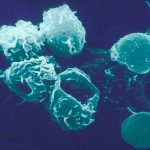Link to Pubmed [PMID] – 26779601
Nat. Immunol. 2016 Mar;17(3):269-276
The precise lineage relationship between innate lymphoid cells (ILCs) and lymphoid tissue-inducer (LTi) cells is poorly understood. Using single-cell multiplex transcriptional analysis of 100 lymphoid genes and single-cell cultures of fetal liver precursor cells, we identified the common proximal precursor to these lineages and found that its bifurcation was marked by differential induction of the transcription factors PLZF and TCF1. Acquisition of individual effector programs specific to the ILC subsets ILC1, ILC2 and ILC3 was initiated later, at the common ILC precursor stage, by transient expression of mixed ILC1, ILC2 and ILC3 transcriptional patterns, whereas, in contrast, the development of LTi cells did not go through multilineage priming. Our findings provide insight into the divergent mechanisms of the differentiation of the ILC lineage and LTi cell lineage and establish a high-resolution ‘blueprint’ of their development.

